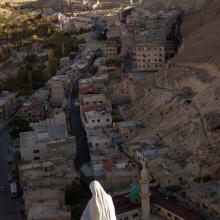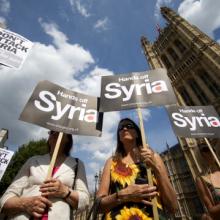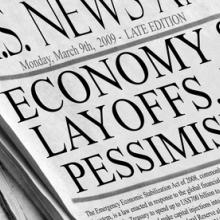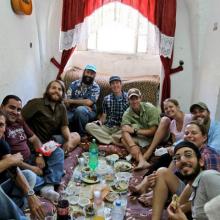Middle East
GEORGE MITCHELL, the former U.S. senator who famously brokered peace in Northern Ireland, knows the path to peace is unpredictable. “Until it happens,” he said, “you can’t predict with certainty. ... You can’t take ‘no’ for an answer. ... You just have to keep at it until peace is achieved.”
After five years of stalled Middle East peace talks, Secretary of State John Kerry lured Israeli and Palestinian negotiators back to the peace table in July. Sadly, my desk is littered with articles by naysayers who seem more than willing to “take ‘no’ for an answer” when it comes to peace in the Holy Land.
Naysayers point to the expansion of Jewish settlements and the political power of Israeli hawks, as well as the divisions in Palestinian society that convince them there is “no true partner for peace.” Certainly years of disappointments and failed negotiations offer ample cause for skepticism.
But I agree with Faisal Abbas, who suggests that cynicism is a lazy option we can’t afford. “Negotiations may succeed or fail to achieve peace,” he writes, “but the alternative (not having these negotiations) is guaranteed to fail.”
A huge statue of the Virgin Mary towers over churches, monasteries and mosques in the Syrian city of Maaloula, where a dialect of the Aramaic language of Jesus is still spoken.
The town has managed to stay out of the Syrian conflict between Sunni Muslim rebels and the regime of dictator Bashar Assad, as have most of Syria’s 2 million Christians.
But worsening violence has forced the community into a corner: Continuous clashes between the rebels and the regime in this isolated town of 2,000 people as well as other Christian towns over the past two weeks have many Christians worried that they will no longer be allowed to stay neutral.
I have read countless articles from political, religious, and ethical perspectives on why or why not the U.S. should militarily intervene against the Syrian regime. Most do a decent job evaluating the situation, but I have yet to read one that really puts the human element on the table as a deciding factor.
A few months ago I was going to bed in my hotel room in Tel Aviv when I saw the breaking news alert that there was rocket exchange between Hamas and Israel in and around Gaza. While I have been to many places in "conflict," there is something much different about being somewhere that is only miles away from live fire.
I started playing out the situation in my head: "What if this expands into a major conflict? Can I catch a flight back home to be with my family before it gets worse? I'm only 30-40 miles away from the active conflict, am I already in range sitting in this hotel room?"
Anxiety. Fear. Uncertainty.
Now let me be clear, that experience of anxiety and fear is NOTHING compared to what most Israeli's, Palestinians, Egyptians, or Syrian's have felt in recent years (and MANY other populations). But — even if only in some small way — I could immediately feel the weight of pending war. It is palpable. It is crippling. And if I had my family with me, it would have potentially been unbearable.
On Wednesday, President Barack Obama said that if Bashar al-Assad used chemical weapons against innocent civilians, there must be “international consequences.” The president is right. But what should those consequences be?
The issue here, again, is one that we have not decided how to deal with: terrorism. The definition of terrorism is deliberate and brutal attacks upon innocent people — whether by individuals, groups, or heads of state. By that definition, Assad is a terrorist. And terrorists who possess weapons of mass destruction and demonstrate their willingness to use them are most dangerous ones. But how should we respond?
I am in in the U.K., where political leaders last night backed off the decision to make immediate “military strikes” while the U.S. and other nations are considering them. The feeling here is that international and legal legitimacy need to be established first, that the U.N. inspectors should finish their examinations in Syria before any actions are taken, and that all other means of response should be fully explored first. These are good decisions.
Why is there such public “war fatigue” in the U.K. and the U.S. in light of Iraq and Afghanistan — and why is that creating reluctance to more military action? Because wars and military solutions have FAILED in response to terrorism — failed to achieve what they were purported to do.
People who hoped the Arab Spring would lead to greater religious freedom across the Middle East have been sorely disappointed, and a new Pew study confirms that the region has grown even more repressive for various religious groups.
“In 2011, when most of the political uprisings known as the Arab Spring occurred, the Middle East and North Africa experienced pronounced increases in social hostilities involving religion, while government restrictions on religion remained exceptionally high,” according to the report by the Pew Research Center.
The study shows the number of countries in the Middle East or North Africa with sectarian or communal violence between religious groups doubled from five to 10 during 2011, a year that coincided with most of the political uprisings of Arab Spring.
LIKE MANY Palestinians forced from their homes during the 1948 war, relatives of Jordan’s Sen. Haifa Najjar carried the keys to their Palestinian homes with them as they fled. These keys, passed down through generations, are powerful symbols of Palestinian ties to the land that international law considers theirs—even as their hope for return wanes.
As a Christian appointed by King Abdullah II to Jordan’s upper house of Parliament, Najjar is active in the education, environment, cultural, and legal sectors of the government. She is also superintendent of the Anglican-run Ahliyyah School for Girls and Bishop’s School for Boys in Amman, Jordan.
Within the mix of the 500,000 Palestinians who relocated to Jordan because of the Israeli War of Independence—or Nakba, “the catastrophe,” depending on who you ask—was a vocal minority of Palestinian Christians who joined their ranks with the existing Jordanian Christian community. Prior to 1948, Christians accounted for nearly 20 percent of the population of what is now Israel/Palestine. Today that figure is less than 2 percent. Even more dramatic are declines in the West Bank cities of Ramallah and Bethlehem. Christian populations are nearly extinct in these locations compared to their respective majorities of 90 and 80 percent prior to 1948.*
“They moved not as immigrants; they were initially thinking it was a temporary thing,” says Father Nabil Haddad of the Melkite Catholic Church in Amman. “It is similar to what Syrians are thinking right now when crossing the barbed wire, not the checkpoints, between south Syria and north Jordan.”
TODAY THE Middle East—where about 60 percent of the population is under the age of 25—is a region dominated by humiliation and anger. Failure plus rage plus the folly of youth equals an incendiary mix.
The roots of anti-American hostilities in the Middle East run deep. We can start with the fact that what we consider our oil lies beneath their sands. Couple that with U.S. support of repressive regimes, the presence of foreign troops on their land and in their holy places, and the endless wars waged there, ultimately fueled by the geopolitics of energy. Add to that the unresolved Israeli-Palestinian conflict, which continues to drive the deepest emotions of mutual frustration, fear, and retaliation throughout the Middle East and around the world.
Injustices and violence caused by the oil economy have sparked a reaction from dangerous religious fundamentalists in the Muslim world. Fundamentalism—in all our faith traditions—is volatile and hard to contain once it has been unleashed, and it is hard to reverse its essentially reactive and predictably downward cycle.
Three principles may help us navigate a path out of this mess. First, religious extremism will not be defeated by a primarily military response. Ample evidence proves that such a strategy often makes things worse. Religious and political zealots prefer military responses to the threats created by Islamic extremism. Ironically, this holds true on both sides of the conflict; the fundamentalist zealots also prefer the simplistic military approach because they are often able to use it effectively. Fundamentalists actually flourish and win the most new recruits amid overly aggressive military campaigns against them.
Current events, like much about our lives, frequently leave us hopeless, fearful, and uncertain. Religious faith isn’t a matter of wishing away these experiences; it involves perceiving God in the midst of our hardships.
I still remember one Friday night when I, an overly sensitive preteen, made a conscious decision to stop watching the nightly news with the rest of my family. I found what I saw too depressing and threatening: crime after crime, yet another house fire, economic challenges, too much Cold War.
I don’t recall how old I was when I mustered the willpower to face the news again on a regular basis. But a quick scan of the latest headlines makes me wonder why I still subject myself to it: the imminent and potentially crippling sequester, American drones flying in and out of Niger, Iran’s growing nuclear capability, recurring bloodshed in Syria. Maybe I had it easier back in middle school.
WASHINGTON — It’s an idea that feels particularly poignant this Thanksgiving: American Jews and Muslims banding together to help the homeless and other needy people.
The interfaith collaboration has been going on for five years, but the recent exchange of rockets between Gaza and Israel is weighing especially hard on both communities this week. That's why a joint session of sandwich making or a group visit to a nursing home has taken on added significance.
“In this time of warfare it was a beautiful experience to see the two come together,” said Haider Dost, a Muslim student at Virginia’s George Mason University who worked with Jewish students to feed the homeless Sunday in Franklin Park, just blocks from the White House.
Over the past four years I have had the opportunity to spend a significant amount time in the Middle East. I no longer approach the time as a tourist, but instead seek out relationships and experiences as a listener who has much to learn about the way God is at work in contexts much different than my own. In that posture, it has been remarkable how much I have learned and begun to integrate into the way I live, love and lead back in my neighborhood. Theologian Paul Knitter describes it well when he refers to ones inherited worldview as a telescope.
"No matter how objective we may think we are or desire to be, we all see the world through a specific telescope/worldview. When we choose to look through the telescope of people who are “different” than us, we begin to get a more comprehensive picture of the world and the way God is at work within it."
Leading our first Learning Community to the Middle East apart of The Global Immersion Project I recently co-founded, I was invited to take a look through the lens of friends’ telescopes who live amid conflict in Israel and Palestine. Here are some of my key learnings:
A possibly significant development in Muslim-Christian-Jewish relations is being spear-headed by the Islamic Scholars of North America (ISNA). In July of 2012, ISNA Director of Community Outreach, Dr. Mohamed Elsanousi, convened a small multilateral forum of scholars in Mauritania to discuss challenges faced by religious minorities in Muslim-majority communities around the world.
Mauritania is an interesting choice, since it has no indigenous Christian population, and the CIA World Factbook lists the country as “(official) 100% Muslim.”
So, officially, Mauritania is 100 percent Muslim, which begs the question: If the ISNA is reaching out to Islamic scholars in Mauritania on the issue of minority religious rights, and the (official) statistic is that Mauritania is 100 percent Muslim, is this a tacit recognition on ISNA’s part that some of the 100 percent officially Muslim Mauritanians have secretly switched their religion … and that international human rights standards should allow them to do so?
If that’s the case, then this is a significant development in interfaith relations.
… the key word being if.
WHEN AMBASSADOR Chris Stevens and other embassy staff were killed in Benghazi in September, it struck close to home for us at Sojourners. The last time a U.S. ambassador was slain was in 1979, when Adolph Dubs, the American ambassador to Afghanistan, was kidnapped by Islamic extremists and later killed. His daughter, Lindsay Dubs, was Sojourners’ managing editor. The degrees of separation between world events and the home front are often slim.
Some attributed last month’s violence in the Middle East to “fanaticism,” a “blind and tragic barbarism” by “imbeciles.” Others used words such as “beyond pathetic,” “fringe,” and “extremists.”
Those descriptions were applied to both those who created the anti-Islam video that provided the spark, and those who used the hateful video as a reason, or excuse, to engage in violent protests against the United States and the “West,” including Israel.
The media repeatedly summarized the cause of the violence as resting in the intentionally offensive video, and said that Muslims, angered by the blasphemous depiction of the Prophet Muhammad, rioted in a blind and uncontrollable rage. Moustafa Bayoumi, writing for the Middle East Research and Information Project, described the process: “Islamophobes provoke. Too many Muslims respond. Non-Muslims believe Muslims are crazy. Muslims are told the West hates them, and the Islamophobic right sleeps well at night with their cozy dreams of a mission accomplished.”
The most recent discussions of U.S. foreign policy and the Middle East, once again say more about politics during an election year, than they do about the fundamental issues we must confront if we want to see substantial change.
So let’s look at the basic issues and fundamental choices we need to make.
Today the Middle East — where about 60 percent of the population is under the age of 25 — is a region dominated by humiliation and anger.
Failure + rage + the folly of youth = an incendiary mix.
The roots of anti-American hostilities in the Middle East run deep (literally and figuratively). We can start with the fact that our oil (and its economy) lies beneath their sands. Couple that with U.S. support of repressive and backward regimes, the continual presence of foreign troops on their land and in their holy places, and the endless wars waged there, ultimately fueled by the geopolitics of energy.
Add to that incindiary cocktail the unresolved Israeli/Palestinian conflict, which continues to drive the deepest emotions of mutual frustration, fear, and retaliation throughout the Middle East and the rest of the world.
Injustices and violence caused by the oil economy have sparked a reaction from dangerous religious fundamentalists in the Islamic world. Fundamentalism — in all our faith traditions — is both volatile and hard to contain once it has been unleashed, and it becomes hard to reverse its essentially reactive and predictably downward cycle.
“Sticks and stones can break my bones, but words can never hurt me.”
How many of us grew up with this old adage ringing in our ears? How many of us believe it’s true?
I’ve gone back and forth over the years. I understand that the saying is an invitation to turn our backs on harsh, mean-spirited words thus robbing them of their power, but how many of us are really capable of simply doing that? The truth is words do hurt and sometimes they do more than hurt. Sometimes they are downright destructive and on a large scale.
I think this is what the writer of James is getting at in this morning’s text. Words, the works of our tongues, can be used for good and evil. It is not always easy for us to shape our words and move our tongues in a fashion that serves our faith, our calling as Christians, our work for the reign of God on earth.
One important spiritual discipline, one vital element to our faith formation, then, is learning to tame the tongue. That is, we are challenged to develop custody of our speech in such a way that good news is proclaimed and people are lifted up toward the fulfillment of their creation in the image and likeness of God. Remember, James is especially concerned that we align our words and our work so we both “talk the walk” and “walk the talk.”
If we are offspring of the heavenly parent, if we are made in the likeness of God, how should that shape our speech and control the way we wag our tongues?
My heart is heavy.
Every day for the last week, media outlet have told their version of the current uprising stretching across the Middle East (Egypt, Libya, Yemen). Whether it’s pictures of embassies burned to the ground, rioting citizens, or highly politicized comics, the surge of content has been anything but “feel-good” and hopeful.
And that’s because the events and corresponding responses have been anything but “feel-good” and hopeful.
My heart breaks because I know the events that are unfolding do not represent the majority of those who inhabit the Middle East. I spend a significant amount of time in there and have built deep, life-long friendships.
Just two weeks ago I sat around a table and shared a meal with Christians, Jews and Muslims in the home of a devout Muslim family in the region. A day after that, I served alongside Muslim youth workers who are promoting non-violence and reconciliation in the face of oppression and poverty.
On the same day, I sat with an Arab Christian who embodied Jesus’ teaching in the Sermon on the Mount in dealing with daily injustice by saying, “We refuse to be enemies.” Lastly — and what keeps playing over and over in my head — are the words spoken to me by a Muslim friend named Omar who said,
“Please give this message to all of your American friends. We (Arab Muslims and Christians) desire peace. The violence you see in the news does not represent us. It is not the majority, it is the smallest minority of extremism. Please listen to our story and accept our friendship.”
Anti-American riots that have spread to more than a dozen countries across the Middle East are a sign of fissures between radical and more moderate Islamists that are vying for power as their societies undergo change, Middle East experts say.
Whether U.S. foreign policy has helped create a political environment where radicals are struggling to remain relevant, or emboldened extremists to act out, is a matter of disagreement.
President Obama's approach to the Arab Spring, to engage with the Islamists and not the secularists, "is seen by our foes as disengagement, while the radicals are not backing off," said Walid Phares, an adviser to the Anti-Terrorism Caucus in the U.S. House of Representatives and author of the 2010 book The Coming Revolution: Struggle for Freedom in the Middle East.
"When we withdraw, they advance."
Tamara Wittes, who served as deputy assistant secretary of state for Near Eastern Affairs until a few months ago, sees it differently.
The U.S. military withdrawal from Iraq removed "a massive source" of grievance for ultra-conservative Muslims, called Salafis, who have been leading the charge in the recent protests and who are ideologically close to Islamic terrorists who have warred with the U.S., Wittes said. "Now they're left trying to gin up anti-American feelings over this campy movie. If Salafi groups are left having to troll the Internet for a pretext, I think we're in pretty good shape."
A group of Episcopal bishops is asking President Obama to help assure that a United Nations agency continues to support a diocese-run hospital in the Gaza Strip.
In a June 6 letter, the 102 bishops ask the president to support funding for Al Ahli Hospital from the United Nations Relief and Works Agency for Palestine Refugees. The letter asserts funding was cut off in May, though an UNRWA official said a final decision has not been made.
The hospital, run by the Episcopal Diocese of Jerusalem, “is the only facility of its sort in the Gaza Strip that is not run by the Hamas government and as such, it is able to provide care without any outside interference or political calculation,” the letter states.
While compiling the morning “Daily Digest,” I often recall the advice of Karl Barth, who is said to have told young theologians “to take your Bible and take your newspaper, and read both. But interpret newspapers from your Bible.”
There are many mornings that Jesus’ advice comes to mind after reading the news. When you hear of wars and rumors of wars, do not be alarmed; this must take place, but the end is still to come (Mark 13:7). While I am not an end times apocalyptic, there are days that Jesus’ prophecy seems all too real.

It seems like every day we hear from another politician saying that “we are ready to attack Iran if necessary," or from another pundit full of hot air telling us why we should invade Iran right now.
The presumptive Republican nominee, Mitt Romney, has said that he would support “something of a surgical-strike nature, to something of a ‘decapitate the regime’ nature to eliminate the military threat of Iran altogether.” President Obama has said: “Every option is on the table.” All of these conversations typically go along the lines of emphasizing how Iran poses a serious and immediate threat to the United States.
As was the case in the conversations leading up to the 2003 Iraq war, there is much heat, and not a whole lot of light.
CAIRO, Egypt — From her home, Samia Ramsis holds a key chain bearing the face of the Virgin Mary as visitors outside come to look upon the spot where Egypt's Coptic Christians believe Mary, Joseph and the infant Jesus found refuge after fleeing Bethlehem.
Once crowded with Christians, Cairo's Coptic quarter where she lives with her husband, Mounir, and two children is now home to fewer than 50 Christian families.
"We know many Christians have left," said Mounir Ramsis, speaking not only about this quarter but about all of Egypt. "But we love this country and will stay until death."
The Arab Spring uprisings that toppled secular dictatorships have unleashed long-suppressed freedoms that have allowed Islamic parties to gain a share of political power they have been denied for decades. Their rise is creating near-panic among ancient Christian communities that dot the Muslim world and predate Islam by centuries.










